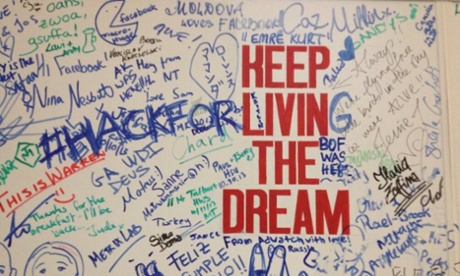
Having volunteered with AgeUK over the past few years, I have come to know that haste and chaos is not a resounding part of their style of doing things. So when I heard they were hosting a hack weekend, I wasn't sure what to expect.
Friday 5:30pm: Interviews
Breaking away from the prevailing ethos of hell-for-leather hacking, burning you and your laptop out, the kick-off was a rather calm, well organised evening at the OXO tower. We were to socialise and interview the people for whom we were designing and developing products and services over the next couple of days.
At first this seemed a strange approach, as we would only have 36 hours to give birth to and develop a fledgling idea, but after about ten minutes we realised the value it would bring throughout the process. More importantly, it disclosed a poignant point raised repeatedly throughout the weekend – there is a common and antiquated stigma surrounding the elderly and what they want or need after retiring – if retiring is indeed what they want – and how technology can and will play a role in this.
Both interviewees had seamlessly integrated technology and the internet in their day-to-day life. Running their businesses, socialising with friends and family (albeit through Skype rather than social networks), catching up on news, and most other functional aspects to life where there is an obvious benefit to be found.
This equipped us with a very valuable piece of knowledge to apply over the duration of the event - digital was embraced, but not just for the sake of it or pass time. They had more important things to do.
Saturday/Sunday 9am: Let the hack begin
We start at 9am with a couple of pastries, coffee, a quick overview of the research findings and what we are to expect of the coming days. We then split into our groups (predefined by our skillsets prior) to run through the personas given to us and applying a list of lenses (different circumstantial positions).
We then throw as many ideas against the wall as cognitively possible. After deciding that there was enough enthusiasm and reason for an idea, we would split off from collection of groups, find a comfy HQ in the Facebook offices, and develop it further.
Throughout the process, we were questioned by Fjord, Brezzie, and others who would be part of the judging, which kept us alert and permanently challenging the routes we were following. This made sure we didn't rabbit-hole with a terrible idea (which has, in the past, led to tears after having spent a solid 30 hours working on something and someone asks, "but have you thought about this"). These conversations also surfaced more ideas by bringing otherwise unseen but relevant bits of the comprehensive study to our attention.
Fin: The judging
Coming to the end of the Sunday, a general Zeitgeist had emerged from the weekend. This could be seen from what the teams had pulled together:
- We Love Family - focusing on social family activities
- 1Hub - A place to have local conversations
- Team 3 - A platform to link retirees and mentors in technology
- 65ers (my team) - A system to link elderly volunteers and local people in need through finding / hosting events
- Team 5 - linking gym members with people who might need other physical tasks done (e.g. gardening)
- Brightmore (Winner) - An idea for skills that might be lost with the older generations to be shared
As the teams presented, some common themes emerged: trying to solve social isolation (one of the biggest dangers in old age); allowing people to sustain independence; both as a community and as individuals, and maintaining an exciting, progressive life for people who now have more time and energy to do so than most.
Brightmore was a perfect amalgam of the above challenges and deserved winner. Impressively they had also managed to address the seldom spoke about topic of retirees earning a wage post-retirement, but knitting it in with education and generational knowledge transfer.
Team 6 - Brightmore: idea to share potentially lost experience post retirement #Hackforliving pic.twitter.com/NezE1Tae6V
— hdti (@HDTI_CovUni) March 23, 2014
Personally I found the environment created by our fabulous hosts one of the most calm and organised I had experienced during a hack project. Creating an event where there was little room to spill and waste our much needed time into something meaningless. One might argue that this is against the general anarchic nature of some hack events, but given the scale of the problem that was trying to be solved, it was a great mental soil for some well thought out seeds to grow from.
In one word the weekend was: educational. Not only in how it was run, allowing for reckless abandon, but to the backdrop of quality research and first-hand obtained information and opinions, leading to ideas and services designed for the people who are meant to use them.
You can read more about the findings over at the sustainability blog.

